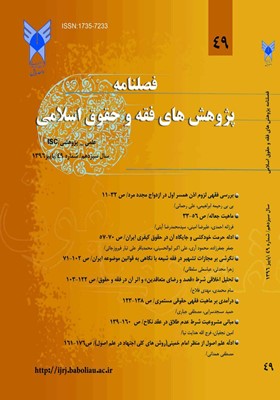تحلیل اخلاقی شرط «قصد و رضای متعاقدین» و اثر آن در فقه و حقوق
محورهای موضوعی : حقوق خصوصی
1 - دانشیار گروه حقوق خصوصی، دانشگاه مازندران، بابلسر، ایران
2 - استادیار گروه حقوق خصوصی، واحد آیتالله آملی، دانشگاه آزاد اسلامی، آمل، ایران
کلید واژه: قصد, قرارداد, تحلیل اخلاقی, رضا,
چکیده مقاله :
در اخلاق مجموعهای از عادات و رسوم اجتماعی و تعالیم مذهبی و داوریهای مستقل عقلی است که وجدان عمومی را تشکیل داده و برای رسیدن به کمال ضروری است. در نظام حقوقی ما با وجود بحثهای بسیار پیرامون ارتباط فقه و حقوق با اخلاق به این پرسش پاسخ داده نشده است که آن اصول و قواعد اخلاقی موجد این ارتباط چیست. در این مقاله با کنکاشی در آیات و روایات و منابع فقهی و حقوقی با روش تحقیق کتابخانهای به استخراج مبانی اخلاقی مؤثر بر مرحله انعقاد قراردادها پرداختهایم. در این پژوهش سعی شده است تا اصول و قواعد اخلاقی در قالب قواعد فقهی و دینی بیان شده تا از طریق جامعیت منابع فقهی به طور دقیق و کامل تبیین و تشریح شود. وانگهی، این شیوه با بکارگیری منابع فقهی به عنوان پشتوانه و معیار مشترک صدق و کذب ادعاها در جامعه ما، اهمیت بسیاری در کاربست دقیق و مطمئن قواعد اخلاقی در حوزهی قراردادها خواهد داشت. تحلیل و بررسی با نگاه اخلاقی و از طریق ابزار و تکنیک باید و نبایدهای اخلاقی مبانی شرط اساسی قصد طرفین و رضای متعاقدین نشان میدهد که اعتبار این شرط ریشه در اصول و قواعد اخلاقیای همچون حرمت اکل مال به باطل، تبعیت عمل از نیت و منع اجبار و تجاوز به حقوق اشخاص در روابط اجتماعی دارد. بر این اساس، تفکیک میان قصد و رضا در ضمانتاجرا، بیوجه بوده و فقدان قصد و عیب رضا ناشی از اکراه و اشتباه باید سبب بطلان عقد گردد.
In ethics, it is a collection of social habits and religious teachings and independent judgments that make up the general conscience and are necessary to achieve perfection. In our legal system there are many debates about relation between jurisprudence and law with ethics, yet we do not answer to this question that what these rules and principles that cause this relation are. In this paper, we derived moral principles affecting the contracts by exploration of the verses and reports and Jurisprudential and legal resources. This method will have a great deal of importance in the accurate and secure application of the rules of the moral law in the field of contracts. Analyzing the ethical perspective, through the tools and techniques, and ethical imperatives of the fundamentals of the essential condition of the parties' intention and the consent of the parties indicate that the validity of this condition is rooted in moral principles and rules such as prohibition of possession in others property, compliance of action from intent, prohibition of coercion and violating the rights of individuals in social relations. Accordingly, the distinction between intention and consent is without reason, and lack of intent and defective consent caused by the reluctance and the mistake must lead to the invalidation of the contract.
الف- فارسی
10. عمید زنجانی، ع، (1386)، قواعد فقه (بخش حقوق جزا)، انتشارات سمت، تهران.
ب- عربی
_||_
1. Amid Zanjani, A. (2007). Jurisprudence rules. Tehran: Samt Publication.
2. Ansari, M. (1994). Ketab Al-Makaseb. Qom: Islamic Thought Complex.
3. Bahreini, Y. (1988). Hadaegh Nazereh. Qom: The Foundation of Islamic Publishing.
4. Daneshpajouh, M. (2011). Introduction to human rights. Qom: Institute of Science and University.
5. Helli, A. (1992). Rasael Altese. Qom: Library of Grand Ayatollah Al-Marashi.
6. Helli, H. (1992). Ghavaed Al Fegh. Qom: Islamic Publishing Corporation.
7. Helli, H. (1995). Tazkarat Al-Foghaha. Qom: Al-Bayt Foundation.
8. Hur Ameli, M. (1988). Vasayel Shi'a. Qom: Ahlal Bayt Foundation.
9. Husseini Maraghi, M. (1996). Al Anavin. Qom: Islamic Publishing Corporation.
10. Isfahani, M. (1997). Hashieh Ketab Makaseb. Qom: Anvar Alhoda.
11. Izanloo, M. (2003). Clauses limiting and excluding liability in contracts. Tehran: Enteshar Publication.
12. Katouzian, N. (1998). Civil law (Unilateral legal act). Tehran: Dadgostar Publication.
13. Katouzian, N. (1998). Philosophy of right. Tehran: Enteshar Publication.
14. Katouzian, N. (2004). Civil law (General rules of contracts). Tehran: Enteshar Publication.
15. Katouzian, N. (2004). Civil law (Legal acts). Tehran: Enteshar Publication.
16. Khoei, A. (1982). Mesbah Al Feghaheh. Qom: Al-Davari Library.
17. Majlesi, M. (1982). Bahar Al Anvar. Beirut: Al-Vafa Foundation.
18. Mofid, M. (1992). Masael Saghani. Qom: World Conference of Sheikh Mofid.
19. Mohaghegh Damad, M. and Qanavati, J. and Heddaty Shibairi, H. and Abdi Pour, I. (2000). The Rights of contracts in jurisprudence. Tehran: Samt Publication.
20. Mohaghegh Damad, M. (2006). Rules of jurisprudence. Tehran: Center for the Publication of Islamic Sciences.
21.Moqaddas Ardebili, A. (1990). Al Faeedah and Burhan. Qom: Islamic Publishing Corporation.
22. Mousavi Bojnordi, M. (1998). Ghavaed Al Fegh. Qom: Al-Hadi.
23. Mousavi Khomaini, R. (1989). Ketab Al Bei. Qom: Ismailic Foundation.
24. Naeini, M. (1992). Ketab Al Makaseb va Albei. Qom: Islam Publication.
25. Naeini, M. (1997). Monia Altaleb. Qom: The Foundation of Islam Publishing.
26. Najafi, M. (1368). Javaher Al- Kalam. Tehran: The Islamic Book House.
27. Naraghi, A. (1997). Mostan Al-Shia. Qom: Al-Bayt Foundation.
28. Naraghi, M. (2004). Jameh Al-Sa'dat. Qom: Islamic Publication.
29. Poryousef, A. (2012). Al-Mizan and Nemouna. Tehran: Shahed Publication.
30. Qazali, A. (1987). Ehyae Olum. Cairo: Al-Ahram Center for Translation and Publishing.
31. Rouhani, M. (1997). Menhaj Al Feghaheh. Tabriz: Scientific Printing.
32. Safaei, H., Imami, A. (2005). Family law. Tehran: Mizan Publication.
33. Shahidi, M. (2005). Formation of contracts and commitments. Tehran: Majd Publication.
34. Tara, J. (1966). Philosophy of rights and rulings of in Islam. Tehran: Tehran University Publication.
35. Warnock, J. (1989). Philosophy of ethics. Tehran: Tehran Publication.


